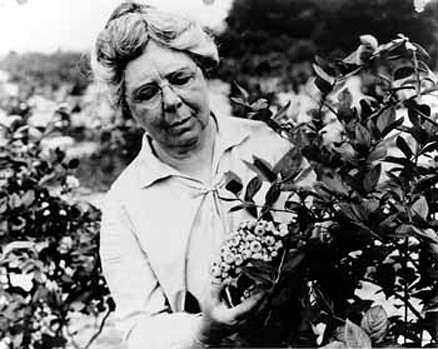
A Whitesbog, NJ, native born in 1871, Elizabeth Coleman White spent her childhood summers helping out on her parents' cranberry farm in the Pine Barrens. While harvesting cranberries, she often wondered if the wild blueberries sprinkled on her parents' farm could be cultivated like the cranberries. Conventional wisdom at the time held that wild blueberries varied too much in size and sweetness and could not be cultivated. A true pioneer, she embarked on a new mission – cultivate the wild blueberry.
Determined to succeed, White enlisted the expertise of USDA botanist Frederick Coville, who at the time was doing work with blueberry breeding. The pair successfully developed and marketed the first cultivated blueberry bush, planting the seeds for a billion-dollar industry.
Her innovation didn’t stop there -- she helped start the New Jersey Blueberry Cooperative Association, which found creative ways to market the cultivated blueberries. She also put her cultivation knowledge to use cultivating holly trees and other plants. Her tireless work helped New Jersey become one of the country’s top blueberry-producing states.
Outside of the agriculture realm, she had a passion for helping the disabled. She was one of the founders of a work-training school and supported research to teach people with disabilities.
She also belonged to several organizations, including becoming the first woman to become a member of the American Cranberry Association. For her contributions to the agricultural industry, she was the first female to receive a citation from the New Jersey Department of Agriculture.
White’s influence and passion for specialty crop cultivation continues today in two of the programs in the USDA Agricultural Marketing Service. Cultivated blueberries are one of the several commodities that are a part of our Research and Promotion Program, which uses research and marketing tools to help support agricultural industries. In 2011, the Blueberry Council allocated over $800,000 of its own funds for research that focuses on the role of antioxidants in metabolism, brain function, cancer, obesity and other health issues.
AMS also offers direct support to growers and women in agriculture. Our Specialty Crop Block Grant Program (SCBGP) funds support innovative research and marketing projects that help blueberries remain competitive in the marketplace.
Last year, through the SCBGP, we supported the Illinois Department of Agriculture’s partnership with Annie’s Project to encourage women to engage in specialty crop production. Through this project, participants will receive financial training, create business plans, and learn risk management practices to help with the insurance and marketing of their farm and crops.
Annie’s Project was founded by Ruth Fleck Hambleton and named after her mother, Annie, who was an equal partner in running and managing their family farm in Illinois. To date, Annie’s Project has helped over 7,000 women in 25 states with similar training programs and opportunities in agriculture.
USDA celebrates Elizabeth Coleman White’s innovative agricultural and philanthropic contributions -- and her love of specialty crops. We also recognize the important role that women have played throughout agriculture, and we hope that through our programs and other USDA initiatives women are encouraged to continue following in her footsteps.
